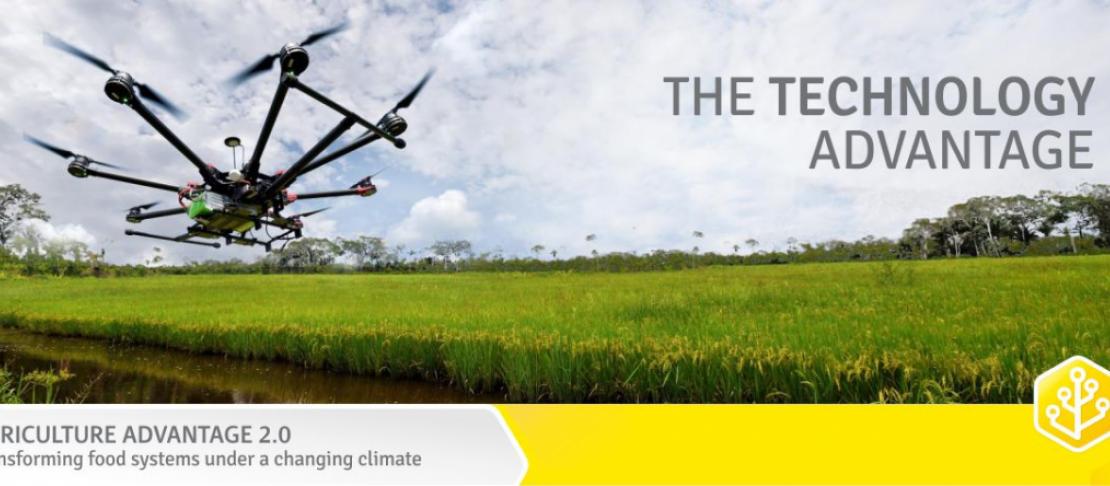Agriculture Advantage 2.0 at COP24 | Technology advantage: Next generation technologies to tackle climate challenges in agriculture

Racing to catch up with climate change impact on food systems through disruptive innovation
Objective
To mobilize a coalition of actors and funding to develop and deploy promising next generation technologies to tackle climate change in agriculture.
Overview
Climate change will require deep changes in agricultural systems to adapt to higher temperatures, more extreme climate events and increases in pests and diseases. This session looks at opportunities to tap into next generation technologies to rise to the challenge and ensure long-term provision of affordable food.
The event kicks off by looking at advances in crop breeding for resilience to climate change for root, tuber and banana crops. Varieties currently grown may not tolerate the higher levels of heat, drought, salinity and emerging diseases anticipated. There is a large genetic reserve we can tap into for improved tolerance and adaptation, and breeding programs are already targeting some traits. But more dramatic action is needed now. A six-step framework for climate-smart breeding is proposed, advocating that breeding needs to do what we have already begun, but faster, better, and smarter!
In rainfed agriculture of the drylands, cropping systems and food systems are and will remain driven by cereal production, especially wheat and barley. But the adaptation and mitigation capacities of these systems may not be achieved without diversified crop rotations, especially with food and forage legumes. A portfolio of genetic innovations and advanced technologies to develop these smart cereal-based agri-food systems is proposed together with a multiscale and multicriteria framework to out- and up-scale them with stakeholders and enterprises.
Emerging technologies driven by the Fourth Industrial Revolution are disrupting many industries, bringing rapid and large-scale change. Four transformative technologies, key for tackling climate change threats to food security, are presented with a vision to attract significantly higher levels of investment and inspire technology start-ups.
The session closes by scoping out the investment cases to further develop agricultural knowledge and innovation systems. This can be a driver for accessing green funding for longer term research.
Tentative program
Speaker | Agenda | Duration |
Hon. Winifred Masiko, Member of the African Gender Network (AGN), Uganda Gender and Climate Change focal point for UNFCCC | Welcome, side event objectives, introduction to speakers | 5 mins |
Opening presentations: Can technological solutions help food systems transform to meet food security and climate change goals? Moderator: Hugo Campos, Director – Research, CIP | ||
Graham Thiele, Director, RTB | Next generation RTB crops: raising the bar for heat, drought, salinity and emerging diseases | 10 mins |
| Q&A | 5 min |
Sean de Cleene, Head of Food System Initiative, World Economic Forum | Transformative technology applications to deliver significant impacts to food systems by 2030 | 10 mins |
| Q&A | 5 mins |
Jacques Wery, DDG – Research, ICARDA | Combining crop rotation improvement and new technologies in the design of climate-smart cereal production in the drylands | 10 mins |
| Q&A | 5 mins |
Ana Maria Loboguerrero, Head of Global Policy Research, CCAFS | Next generation technologies to drive transformation | 10 mins |
| Q&A | 5 mins |
Moderated Q&A with the audience | 15 mins | |
Tobias Baedeker, Agriculture Economist, World Bank | Wrap up linking with investment case for next generation technologies to tackle climate change impacts on food security | 10 mins |

This event is part of the Agriculture Advantage 2.0 event series at COP24, a collaborative effort of more than 15 organizations with the mission to transform agricultural development in the face of climate change. Click here to see the series of events at COP24.
Related resources:
- CCAFS briefing: A 6-part action plan to transform food systems under climate change, available in 2 formats: Exposure story with animated graphics | downloadable Info Note
- CGIAR Research Program on Roots, Tubers and Bananas journal article: Roots, tubers and bananas: planning and research for climate resilience
- CGIAR Research Program on Roots, Tubers and Bananas book chapter: The cases of potato in Kenya and sweetpotato in Mozambique in the Climate Smart Agriculture Papers
- WEF report: Innovation with a Purpose: The role of technology innovation in accelerating food systems transformation
- CCAFS website: MRV Platform for agriculture - Measuring, reporting and verifying greenhouse gas emissions and mitigation, with an initial focus on livestock
- CCAFS report: Measure the chain: tools for assessing GHG emissions in agricultural supply chains
- CCAFS working paper: Making trees count: Measurement, reporting and verification of agroforestry under the UNFCCC
Find out what happened at the event:
- Summary blog: Technology advantage: Is technology the silver bullet?
- Web recording (click "Join the event" to watch after the event)


